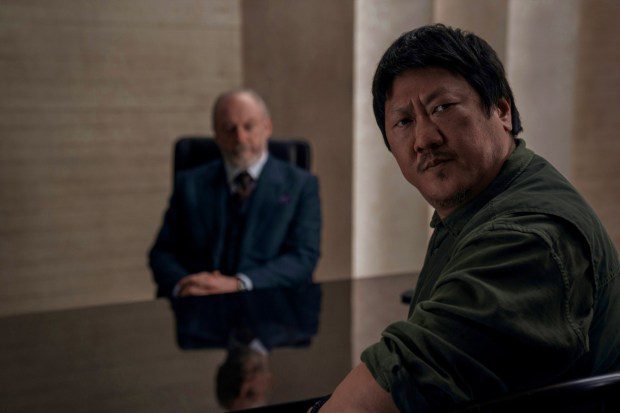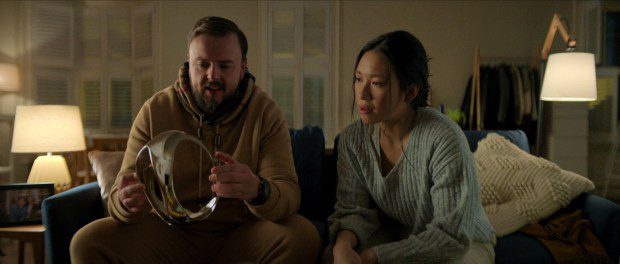How much of your disbelief can you suspend?
If you are willing to just accept the new Netflix series '3 Body Problem' without questioning its frequent leaps in logic, you are more likely to enjoy it.
An adaptation of Chinese author Liu Cixin's award-winning 2008 science fiction novel, 'The Three-Body Problem,' the intriguing show is one of the first big projects of the Netflix deal signed by 'Game of Thrones' showrunners David Benioff and D.B. Weiss, who are leading this project along with fellow executive producer, showrunner and writer Alexander Woo ('True Blood').
The first season has eight episodes and a diverse cast, including some 'Thrones' actors and recognizable movie stars like Eiza González ('Baby Driver') and Benedict Wong, a Marvel Cinematic Universe mainstay.
The show begins with great promise, presenting the viewer with mystery similar to 'Lost' that need to be solved. Unfortunately, after much is revealed, '3 Body Problem' loses a great deal of its initial promise, revealing itself to be a show unable to give its huge story the scale it needs to be believable enough.
The first episode, 'Countdown' — written by Benioff, Weiss and Woo and directed, like the solid follow-up 'Red Coast,' by Derek Tsang ('Better Days') — sets up the major players and the season's multi-time-period narrative.
'3 Body Problem' begins in Beijing in 1966 during the Chinese Cultural Revolution and introduces the young version of Ye Wenjie (Zine Tseng), a woman who has more than one reason to lose faith in humanity. The important character is portrayed in 2024 by Rosalind Chao.
In present-day London, we meet the members of the group the show's production notes refer to as the 'Oxford Five,' a group of young brainiacs who have stayed in touch after college and applied their intelligence to various projects. They are Saul Durand (Jovan Adepo), a physics research assistant who feels it's too late for him to reach his full potential at around age 30; Jack Rooney ('Thrones' alum John Bradley), an outspoken chap who used his physics degree to create a successful snacks empire worth millions; Auggie Salazar (González), the chief science officer for a leading nanotech company; Jin Cheng (Jess Hong), a theoretical physicist with a strong desire for answers to big questions; and Will Downing (Alex Sharp), who chose to teach physics after realizing he couldn't make it in the scientific big leagues.
As Jin and Saul know, it is an uncertain time in the scientific community.
“About a month ago,” Jin tells Auggie at a bar, “all the major (particle) accelerators started generating results that make no (expletive) sense.”
Auggie begins to see a countdown in her field of vision while at a bar, right after a man who had just hit on them is performing a terrible rendition of Billy Joel’s 'Piano Man' on the karaoke stage. No one else can see the numbers, which terrifyingly suggest Auggie has a little more than four days before something occurs.
Also, important scientists are dying from what seems like suicides, which are being looked into by Wong’s Da Shi, an investigator working for a secret organization led by the very confident Thomas Wade (Liam Cunningham, another “GOT” vet).

As Auggie’s countdown continues and after she receives no answers from a neurologist, she is approached by a mysterious young woman we will come to know as Tatiana (Marlo Kelly), who informs her how to stop seeing the numbers.
“You don’t want it to get to zero,” Tatiana says.
Another important character who appears later in the season is Mike Evans, played by Ben Schnetzer as a younger man and by Jonathan Pryce in 2024. (On “Game of Thrones,” Pryce played the religious figure the High Sparrow, and his wealthy Evans also has a major worshiping streak in him.)
We won’t reveal much more about the story, partly because Netflix has requested that several potential spoilers be avoided before the series’ launch.
That makes it hard to be specific about the increasing frustrations caused by the storyline, as many of them come after the major revelation in “3 Body Problem.” We will note, however, that a virtual-reality part of the story — Jin and others use shiny VR headsets that seem to be far more advanced than anything on the market to play a game to try to address the series’ physics problem — seems to be rather pointless in the grand scheme of things.

Without having read the book, which has already been adapted into the Chinese series “Three-Body,” it’s hard to know which plot shortcomings to attribute to Liu and which to the “3 Body” showrunners. Benioff, Weiss and Woo have made changes to the narrative, including the invention of the Oxford Five, but that is to be expected. And let’s remember that “Game of Thrones” was widely considered to be at its strongest when Benioff and Weiss were working from George R.R. Martin’s book series, not when they’d run out of source material after the author had fallen woefully behind in his writing. That said, some of the latter “3 Body Problem” episodes cause groans that feel at least a bit familiar when you make them.
Liu wrote two follow-up novels in what’s known as the “Remembrance of Earth’s Past” trilogy, and the show definitely ends with more story to tell. Surprisingly, however, “3 Body Problem” fails to hit you with more than a small hint of what’s to come. Do not expect anything to leave you waiting breathlessly for its potential return.
“3 Body Problem” has its moments, such as a surprising set piece when Auggie’s nanotech is used to achieve a rather questionable end. But based on the way this season all but runs out of momentum at the finale, its ticking countdown may come to an end sooner than later.
‘3 Body Problem’
What: Eight-episode debut season of hourlong science-fiction drama.
Where: Netflix.
When: All episodes will be accessible on March 21.
Rated: TV-MA.
Rating (out of four stars): 2.









